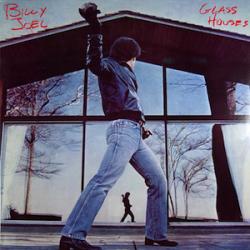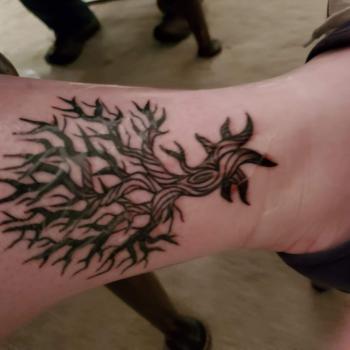Image Source: walknboston on flickr
Have patience with everything that remains unsolved in your heart. Try to love the questions themselves, like locked rooms and like books written in a foreign language. Do not now look for the answers. They cannot now be given to you because you could not live them. It is a question of experiencing everything. At present you need to live the question. Perhaps you will gradually, without even noticing it, find yourself experiencing the answer, some distant day.
-Rainier Maria Rilke
I stumbled on this quote a few months ago in my friend Holly Mohr’s Dark Devotional “Hear Us, O Lord!” for Sick Pilgrim. Her reflection on the gnawing, desperate hunger we so often feel for answers tore through me. I’ve been there. Oh, dearest friend, I’ve been there.
I’ve never read Rilke before, but this quote resonated with me deeply. Before Spring Break began this year, we had yet another “question vs. answer” debate in my Honors Great Books Seminar. This was an especially ongoing theme for us over the course of this our final semester. Apparently, the head of our Honors Program once said that the primary goal of Franciscan’s Great Books Program was to teach students to form good questions. But our professor this semester, a philosophy professor who had never taught Honors before, thinks this goal is rather asinine.
“What’s the point of asking a question if you’re not going to look for the answer?” He has demanded of us more than once.
I realized, as I read Holly’s reflection, this question vs. answer debate has been a perpetual theme in my own life—this semester, yes, but also for as long back as I can remember. I spent so many years searching and grasping desperately for answers. Until, during my sophomore year of college, I was fortunate enough to have two truly brilliant female professors, and these woman taught me the value of questions.
I thought both of them were heretics at first, it’s true. But then I realized that, sometimes, being a good Christian requires a bit of heresy. (I know, I know, just bear with me.) Our classes formed into a sort of “Heretic Support Group,” where we would angstily gripe about all our unanswerable questions and frustrations with so many things—the Church Fathers and their writings were a frequent subject, or that the Church used to condone slavery, or that Aquinas said women were nothing but malformed men.
I remember how, about this time, my father realized that my brother and I were deeply questioning the Catholic Faith. My parents were (unfortunately) still together at the time. Mom told me once that he would frequently demand of her, “If they have questions, why don’t they come to me? I can give them the answers!”
What he couldn’t see was that I’d heard his answers all my life.
For 20 years I’d accepted them as true. I hated myself, I hated him, and I hated God, but I accepted all of my father’s warped teachings as infallibly true. He had cemented himself quite well as the pope of his rotting domestic church.
But eventually, during that sophomore year with those two compassionate women guiding me, I realized I had no desire for the answers anymore. I realized I really didn’t have patience for the theology professors, who took my gnawing existential questions about the universe and my place in it, and squelched them under the weight of a large green Catechism of the Catholic Church: “Well, if you look at paragraph 1252, I think you’ll see that. . .” Even worse were the Theo-Cat classmates, one of whom even sneered at my query, “Oh, come on, that’s like, Catechetics 101!”
To me, answering such questions as these with a paragraph in the CCC or with rote memorization from an Intro to Cat class seemed like an intolerable cop-out. What these professors couldn’t see, what my classmates were blind to, or perhaps what I simply couldn’t communicate to them, was that I didn’t want answers. Not answers like these, at least. Because answers had been shoved down my throat by my tyrannical father all my life.
No, I wanted a friend, a comrade, someone who had enough faith to get down into the mud of my doubts, my fears, my questions, and dig with me.
That’s how I fell in love with our notion of “Heretic Support Group.” It was a safe place to go and gripe about all the things we couldn’t grasp, couldn’t understand, with people who understood. Who listened, and then started to dig together. At the end, I’d leave with a hell of a lot more questions, and very few answers. But I’d leave far more fulfilled, more replenished in faith in this beautifully broken Church than I’d been before.
It reminds me of some research I did once into the allusions to the Book of Job in Chesterton’s Man Who Was Thursday. In one of the journals I explored I remember a line that’s stuck with me ever since: “Where the answers of men fail, the questions of God satisfy.” See, when Job’s lousy friends tried to answer his deepest thirst for understanding, for some sense of justice in what he was suffering, they merely offered him trite platitudes.
But when God answered Job’s rage, He answered him with more questions. And the questions fed Job’s hunger as his friends’ answers never could.
These questions came up again in some difficult discussions between myself and some friends a while ago, after I published my series on “Why millenials are leaving the Church—and why we aren’t.” They were asking me to explain what I actually believe these days. I delved deep into my soul, into my scars and my tiny persevering faith, and tried to articulate it. I believe in the Eucharist, I said. I believe the truths articulated in the Apostles’ Creed. I believe in God’s goodness, in the Trinity, in the Incarnation. When my friends pressed me to explain why I held on to these beliefs, I had no answer to give them. It’s not intellectual, I said. It’s a knowing, an accepting, in my gut. Even though I don’t get it, even though I don’t often know why I believe . . . I do.
And beyond that, for now, I’m really focusing on embracing the ambiguity and accepting the mystery of my questions. Like Rilke said, I’ve spent the last few years learning to be patient, to love even, these unanswered questions.
Strange as it is, answers just won’t do it for me these days.
If you’re a fellow mud-squelcher looking for a friend to dig with you and not simply feed you the usual stale answers, hit me up. I’d love to squelch around, exploring God and the universe with you. -M.K.
Image Credit: https://www.flickr.com/photos/walkn/3526522573













